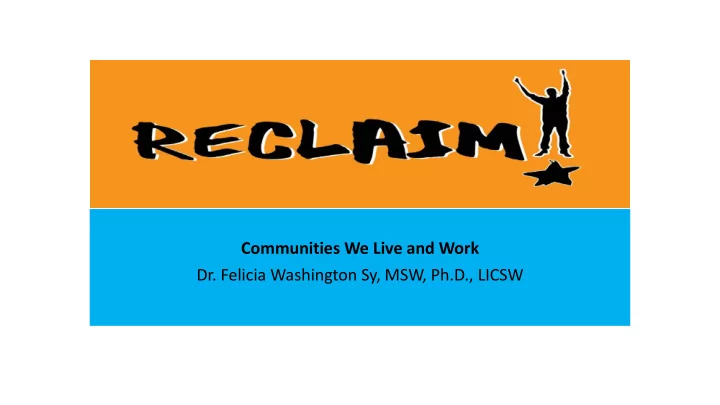

E Communities We Live and Work Dr. Felicia Washington Sy, MSW, Ph.D., LICSW
Age genda • Introductions • RECLAIM’s History • Healing Justice • Allyship • Systems of Oppression and Intersecting Identities • Engaging Individuals, Families, and Communities for Change
Who is this person in Introductions the front of the room?
Name, preferred pronouns, and something about who you are? Introductions
What are you most passionate about and what are you most grateful for? Introductions
E Our history
Making a way out of no way…. Reclaim Created 5/28/2017
Reclaim’s Mission RECLAIM works to increase access to mental health support so that queer and trans youth may reclaim their lives from oppression in all its forms.
Relationship/Change/Gratitude/ Sustainability/Deconstruction Intersectionality/Connections/Associations/integratio n/deep healing over time/name and resist oppression/ relational/inclusion/partnership/continuity/accompa niment/whole bodies-whole minds/humanization/value individual components of collective identity
E Healing Justice
Theory of Change Social Justice as Healing Justice
Healing Justice “ healing justice” is understood as a broader framework that aims to describe the relationship between social justice work and spirit by focusing both on the consequences of systemic oppression on the hope and agency of community members as well as how communities can heal and be restored to vibrant ways of living” Ginwright 2015
In this way, “healing justice organizers” are acutely aware of the ways in which stress, lack of resources, failing educational systems, violence, and prolonged exposure to trauma all diminish the capacity to foster optimism, empowerment, and social change. In addition, healing justice organizers are critical of public policies that create more violence, stress, hopelessness and lack of opportunities in schools and communities and treat these policies as harmful to the individual and collective, social, spiritual and emotional well-being of community members”. Healing Justice: A Conceptual Mapping of Healing Centered Youth Organizing
From this understanding RECLAIM seeks to engage a healing justice model of care that engages individuals, families, and community partners to create ecological systems change in resistance to racism, classism, sexism, heterosexism, cissexism, and ableism.
Be the change….
E Allyship
Being in Allyship With…. An active, consistent, and arduous practice of unlearning and re- evaluating, in which a person in a position of privilege and power seeks to operate in solidarity with a marginalized group
• Allyship is not an identity—it is a lifelong process of building relationships based on trust, consistency, and accountability with marginalized individuals and/or groups of people • Allyship is not self-defined—our work and our efforts must be recognized by the people we seek to ally ourselves with • it is important to be intentional in how we frame the work we do, i.e. we are showing support for…, we are showing our commitment to ending [a system of oppression] by…, we are using our privilege to help by…
Responsibilities if Allyship “We are not acting out of guilt, but rather out of responsibility” • we actively acknowledge our privilege and power and openly discuss them • we listen more and speak less • we do our work with integrity and direct communication • we do not expect to be educated by others, we build our capacity to receive criticism • we embrace the emotions that come out of the process of Allyship, • our needs are secondary to the people we seek to work with we do not expect awards or special recognition
We invite to begin a path toward Allyship
E Systems of Oppression and Intersecting Identities
Social oppression is the socially supported mistreatment and exploitation of a group of individuals. Social oppression is based on power dynamics and an individual's social location in society.
Acts of Resistance Begin with… A fearless searching of the soul and self reflection
Individual Identity and Change “To know who I am is a species of knowing where I stand. My identity is defined by the commitments and identifications which provide the frame or horizon within which I can try to determine from case to case what is good, or valuable, or what ought to be done, or what I endorse or oppose. In other words, it is the horizon within which I am capable of taking a stand.” Charles Taylor , Sources of the Self: The Making of the Modern Identity
INTERSECTIONALITY in·ter·sec·tion·al·i·ty /in(t) ərsekSHəˈnalədē / • noun the interconnected nature of social categorizations such as race, class, and gender as they apply to a given individual or group, regarded as creating overlapping and interdependent systems of discrimination or disadvantage. • "through an awareness of intersectionality, we can better acknowledge and ground the differences among us"
E Engaging Individuals, Families, and Communities for Change
The Power of Identity and Narrative in Creating Change “We must move people to see, think, and feel differently about social issues and how they work so that they respond differently to social problems.” By Nat Kendall-Taylor / Chief Executive Officer at Frameworks Institute
Healing is Resistance
The Power of Narrative
While the conventional stories of our history and our social roles provide a powerful gravitational pull, storytelling has always played a significant part in challenging the status quo. The Role of Narrative in American Values Institute, 2013 Social Change
Questions? s? Dr. Felicia Washington Sy felicia@reclaim.care 612-229-3332
Recommend
More recommend